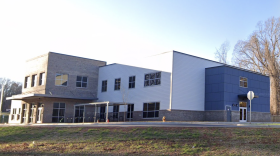The state is closer to opening two virtual charter schools. A special committee on Wednesday cleared two applications of proposed charter schools that would be operated by for-profit companies.
North Carolina Virtual Academy would be managed by K12 Inc., which has had student performance problems in other states, while N.C. Connections Academy would be affiliated with Connections Education.
On Wednesday, the state committee took turns firing off questions to the two eager applicants.
There was the biggest and most obvious question:
What does a virtual charter school even look like?
Mary Gifford, a senior vice president for K12, said students would take most of their classwork online and on their own schedule. Younger grades would spend about half of their time with books and materials. In any case, all students are required to have a responsible adult around who can coach them.
ŌĆ£This is indeed a lifestyle choice, this is not for everyone,ŌĆØ she said.
Earlier this year, lawmakers mandated that the state approve two virtual charter school pilots to open next fall. During WednesdayŌĆÖs interviews, education officials, like Paul Davis, remained cautious.
'Not too sound argumentative but elementary virtual school sounds almost like public-funded homeschooling.'
ŌĆ£Not too sound argumentative but elementary virtual school sounds almost like public-funded homeschooling,ŌĆØ he remarked.
Quality of education
And then there were bigger concerns about the quality of education they would provide.
Becky Taylor, a member of the state board of education, had a pointed question for K12.
ŌĆ£Can you tell me if youŌĆÖve been terminated by states?ŌĆØ she asked. ŌĆ£We hear rumorsŌĆ” And thatŌĆÖs concerning.ŌĆØ
Some virtual academics working with K12 have a history of low graduation rates and poor test scores. TennesseeŌĆÖs online school will close next year if students donŌĆÖt show dramatic gains. The company has also run into trouble in states like Florida, Colorado and New Mexico. But Gifford said no contracts have been terminated, some just havenŌĆÖt been renewed.
Over the years, nonprofits affiliated with K12 have , but have been rejected.
Different perspectives
After the interviews, Mark Jewell with the North Carolina Association of Educators argued that big for-profit companies like K12 waste taxpayer dollars.
ŌĆ£TheyŌĆÖre looking at making money and I think the transparency issue is always going to be on the table there,ŌĆØ he said.
A few seats behind Jewell sat a group of parents with a very different perspective.
ŌĆ£I just thought it was a really good idea,ŌĆØ said Chandra Reed, whoŌĆÖs with the group ŌĆ£I Trust Parents.ŌĆØ
Reed has a son who is out of school now, but said she would strongly consider sending him to a virtual charter school if he were younger.
ŌĆ£Because he was very shy and school didnŌĆÖt really benefit him,ŌĆØ she said.
Her son is the kind of demographic that virtual charter schools are after. They cater to kids who havenŌĆÖt been thriving in traditional settings, whether itŌĆÖs because of academic, mental or social reasons.
After the hour-long interviews, state committee members, like Becky Taylor, seemed torn. She said if the state commits, they have to do it right.
ŌĆ£And not just doing a willy-nilly, ŌĆśOkay North Carolina is in the virtual business now,ŌĆÖŌĆØ she said. ŌĆ£I think if we do that, weŌĆÖre going to be in TVs and newspapers across the nation, and I donŌĆÖt want to go there.ŌĆØ
A few of the members hesitated when they said yes, but all of them agreed to clear the applications for the two virtual charter schools. The State board of Education will make a final decision in February and students could be logging on next fall.










